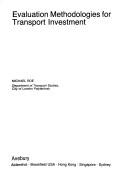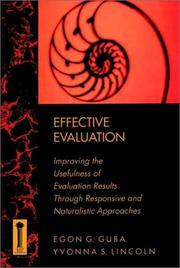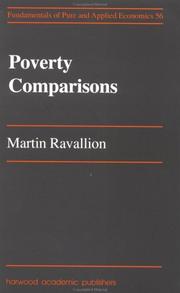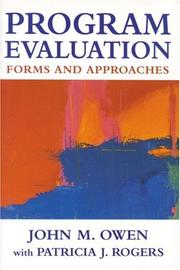| Listing 1 - 10 of 73 | << page >> |
Sort by
|

ISBN: 0566054213 9780566054211 Year: 1987 Publisher: Aldershot Avebury
Abstract | Keywords | Export | Availability | Bookmark
 Loading...
Loading...Choose an application
- Reference Manager
- EndNote
- RefWorks (Direct export to RefWorks)
Corporate finance --- Transport. Traffic --- Great Britain --- Transportation --- Finance --- Evaluation --- Methodology --- Évaluation --- Grande-Bretagne --- Transportation - England - Finance - Evaluation - Methodology --- Transportation - Wales - Finance - Evaluation - Methodology --- Etat --- Investissement --- Pouvoirs locaux --- Transport
Book
ISBN: 0412401002 0442313268 1489969462 Year: 1991 Publisher: London New York Tokyo Chapman and Hall
Abstract | Keywords | Export | Availability | Bookmark
 Loading...
Loading...Choose an application
- Reference Manager
- EndNote
- RefWorks (Direct export to RefWorks)
Nutrition --- Nutritional Status --- Evaluation --- Methodology --- Congresses --- congresses --- congresses. --- Nutrition - Evaluation - Methodology - Congresses.

ISBN: 0875894933 1555424422 9780875894935 Year: 1988 Publisher: San Francisco, Calif. Jossey-Bass
Abstract | Keywords | Export | Availability | Bookmark
 Loading...
Loading...Choose an application
- Reference Manager
- EndNote
- RefWorks (Direct export to RefWorks)
Didactic evaluation --- Evaluation --- Evaluation. --- Methodology. --- Assessment --- Research --- Methodology --- Evaluation Studies --- methods. --- Evaluation - Methodology
Book
ISBN: 9781412962476 9781412962483 1412962471 141296248X 1526485621 1526417936 1526417901 1526417928 Year: 2017 Publisher: Los Angeles, Calif. Sage
Abstract | Keywords | Export | Availability | Bookmark
 Loading...
Loading...Choose an application
- Reference Manager
- EndNote
- RefWorks (Direct export to RefWorks)
Evaluation research can assess the value and effectiveness of interventions and innovations involving people. While this has often been on a grand scale, this book focuses on small-scale projects carried out by an individual or small group, typically lasting for weeks or at most a few months, at a local rather than national level. Using limited jargon and featuring integrated, real-world examples, this second edition offers a clear, accessible background to evaluation and prepares you to undertake your own small-scale evaluation research project. Key features include discussion of: . Different approaches to evaluation and how to choose between them . The advantages and disadvantages of randomized controlled trials (RCTs) . Realist evaluation and its increasing importance . The centrality of ethical and political issues . The influence and opportunity of the Internet Tightly focused on the realities of carrying out small-scale evaluation, Small-Scale Evaluation is a highly practical guide covering the needs of both social scientists and others without this background. Colin Robson is an Emeritus Professor in the School of Human & Health Sciences at the University of Huddersfield.
Book
ISBN: 1000047809 3731504049 Year: 2015 Publisher: KIT Scientific Publishing
Abstract | Keywords | Export | Availability | Bookmark
 Loading...
Loading...Choose an application
- Reference Manager
- EndNote
- RefWorks (Direct export to RefWorks)
In this book a methodology for the evaluation of energy efficiency of mobile working machines by simulation is presented. It allows an efficiency analysis and systematic optimization of a single power train as well as a comparison of different power train concepts. The methodology is applied to a wheeled excavator. To ensure a realistic power demand in the simulation, a rule-based operator model is developed.
simulation --- Energieeffizienz --- Bagger --- Mobile Arbeitsmaschinen --- Bewertungsmethodik --- Antriebssysteme --- Fahrermodellmobile machines --- excavator --- Simulation --- operator model --- energy efficiency --- evaluation methodology --- power trains
Book
ISBN: 9782707170095 2707170097 Year: 2013 Publisher: Paris : La Découverte,
Abstract | Keywords | Export | Availability | Bookmark
 Loading...
Loading...Choose an application
- Reference Manager
- EndNote
- RefWorks (Direct export to RefWorks)
Être évalué paraît généralement aller de soi, voire être désirable : « On m’évalue, donc je suis. » Or ces évaluations sont tout à fait paradoxales : au nom de la rétribution au mérite, elles dénient le mérite véritable et engendrent un climat délétère de concurrence et de sauve-qui-peut ; au nom de « plus d’efficacité », elles créent une forme inédite d’inefficacité ; au nom de l’objectivité, elles écrasent les différences, standardisent, normalisent. De cette omniprésence de l’évaluation et de ses méfaits, ce livre propose une analyse originale, qui, au-delà de la critique, réfléchit aussi à des pistes alternatives en résonance avec une intuition largement répandue : la complexité de la vie sociale n’est pas respectée. Les nouvelles évaluations unidimensionalisent une vie multiple, ignorent les conflits qui font le coeur de l’individu comme de la société et, surtout prétendent être justes et efficaces en dehors de toute situation concrète, réelle : en dehors de toute territorialisation. Une réflexion essentielle pour ne pas se soumettre à cette « évaluation qui tue ».
Evaluation --- Social control --- Performance --- Performance standards --- Contrôle social --- Rendement au travail --- Psychological aspects --- Social aspects --- Aspect psychologique --- Aspect social --- Normes --- Methodology --- Contrôle social --- Social aspects. --- Contrôle --- Évaluation --- Evaluation - Methodology --- Evaluation - Social aspects

ISBN: 9282760987 9789282760987 Year: 1996 Volume: 25 Publisher: Luxembourg Office for official publications of the European communities
Abstract | Keywords | Export | Availability | Bookmark
 Loading...
Loading...Choose an application
- Reference Manager
- EndNote
- RefWorks (Direct export to RefWorks)
Personnel management --- Industrial hygiene --- Industrial safety --- Work environment --- Hygiène industrielle --- Sécurité du travail --- Conditions de travail --- Evaluation --- Methodology --- -Industrial safety --- -Work environment --- -Climate, Workplace --- Environment, Work --- Places of work --- Work places --- Working conditions, Physical --- Working environment --- Workplace --- Workplace climate --- Workplace environment --- Worksite environment --- Environmental engineering --- Industrial engineering --- Industrial accidents --- Industries --- Job safety --- Occupational hazards, Prevention of --- Occupational health and safety --- Occupational safety and health --- Prevention of industrial accidents --- Prevention of occupational hazards --- Safety, Industrial --- Safety engineering --- Safety measures --- Safety of workers --- Accidents --- System safety --- Employees --- Health of workers --- Hygiene, Industrial --- Industrial health engineering --- Occupations --- Environmental health --- Industrial management --- Medicine, Industrial --- -Methodology --- Prevention --- Health and hygiene --- Health aspects --- Methodology. --- -Evaluation --- Hygiène industrielle --- Sécurité du travail --- Climate, Workplace --- Evaluation&delete& --- Industrial safety - European Union countries - Evaluation - Methodology --- Work environment - European Union countries - Evaluation - Methodology --- Industrial hygiene - European Union countries - Evaluation - Methodology

ISBN: 3718654024 9783718654024 Year: 1994 Volume: 56 Publisher: Chur Harwood
Abstract | Keywords | Export | Availability | Bookmark
 Loading...
Loading...Choose an application
- Reference Manager
- EndNote
- RefWorks (Direct export to RefWorks)
Consumption (Economics) --- Cost and standard of living --- Poverty --- Consommation (Economie politique) --- Coût et niveau de la vie --- Pauvreté --- Evaluation --- Methodology --- Méthodologie --- 339.20 --- 339.21 --- 339.325.0 --- 339.325.1 --- AA / International- internationaal --- US / United States of America - USA - Verenigde Staten - Etats Unis --- 330.564 --- 330.564 Verdeling van nationaal inkomen. Inkomensverdeling --- Verdeling van nationaal inkomen. Inkomensverdeling --- Destitution --- Wealth --- Basic needs --- Begging --- Poor --- Subsistence economy --- Comfort, Standard of --- Cost of living --- Food, Cost of --- Household expenses --- Living, Cost of --- Living, Standard of --- Standard of living --- Home economics --- Households --- Quality of life --- Luxury --- Prices --- Purchasing power --- Wages --- Consumer demand --- Consumer spending --- Consumerism --- Spending, Consumer --- Demand (Economic theory) --- Evaluation&delete& --- Verdeling van de goederen en van de inkomens: algemeenheden --- Ongelijkheid en herverdeling van vermogens en inkomens. Inkomensbeleid --- Levensstandaard en verbruikspeil (algemeenheden) --- Evolutie van de consumptie. Budget van de huishoudens --- Surveys --- Methodology. --- Cost and standard of living - Evaluation - Methodology --- Consumption (Economics) - Evaluation - Methodology --- Poverty - Evaluation - Methodology

ISBN: 0803932359 9780803932357 Year: 1990 Publisher: London Sage
Abstract | Keywords | Export | Availability | Bookmark
 Loading...
Loading...Choose an application
- Reference Manager
- EndNote
- RefWorks (Direct export to RefWorks)
"In Fourth Generation Evaluation, Guba and Lincoln present a strong, unequivocal argument for the epistemological, methodological, and ethical superiority of their refined constructivist inquiry paradigm for the political and practical demands of program evaluation." --Jennifer Greene, Cornell University "I would warmly recommend it as stimulating and challenging reading." --Systems Practice "I consider Fourth Generation Evaluation to be an exceptionally daring and insightful book. It has done more than most books to further loosen the grip of liberal, instrumental ''common sense'' (i.e., ideology) that has constricted the field of evaluation for the past 30 years. The book's idealism is energizing and must only be matched, as the authors certainly know, by yet more hard-headed analysis. Its radical ambitions are inspiring if not always apparently achievable. However, fair is fair: radical ends demand radical means." --Evaluation Practice Fourth Generation Evaluation represents a monumental shift in evaluation practice. Guba and Lincoln point to the inherent problems faced by previous generations of evaluators--politics, ethical dilemmas, imperfections and gaps, inconclusive deductions--and lay the blame for failure and nonutilization at the feet of the unquestioned reliance on the scientific/positivist paradigm of research. Fourth Generation Evaluation, a more informed and sophisticated approach, moves beyond science to include the myriad human, political, social, cultural, and contextual elements that are involved. Based upon relativism, a unity between knower and known, and a subjective epistemology, the authors show how fourth generation evaluation unites the evaluator and the stakeholders in an interaction that creates the product of the evaluation. Differing from previously existing generations, this new approach moves evaluation to a new level, whose key dynamic is negotiation. The constructivist paradigm is espoused by the authors and shown to offer multi
Sociological theory building --- Evaluation --- Negotiation --- Methodology --- 343.9.001.5 --- #SBIB:303H60 --- #SBIB:303H15 --- #SBIB:303H12 --- #SBIB:35H415 --- #SBIB:003.IO --- Bargaining --- Dickering --- Haggling --- Higgling --- Negotiating --- Negotiations --- Discussion --- Psychology, Applied --- Criminologisch onderzoek --- Bijzondere methoden: algemeen --- Methoden en technieken van de bestuurswetenschappen --- Methoden en technieken: sociale wetenschappen --- Beleidscyclus: evaluatie --- Negotiation. --- Methodology. --- 343.9.001.5 Criminologisch onderzoek --- Đ 9511 --- -Assessment --- -Criminologisch onderzoek --- -343.9.001.5 Criminologisch onderzoek --- 303.833 --- 303.833 Interpretatie. Evaluatie --(sociaal onderzoek) --- Interpretatie. Evaluatie --(sociaal onderzoek) --- Didactic evaluation --- Evaluation - Methodology. --- Evaluation - Methodology

ISBN: 076196178X 0761961771 184920960X 1446275671 9780761961789 Year: 1999 Publisher: London Sage
Abstract | Keywords | Export | Availability | Bookmark
 Loading...
Loading...Choose an application
- Reference Manager
- EndNote
- RefWorks (Direct export to RefWorks)
Using an original framework, this practical introduction to evaluation shows how to identify appropriate forms and approaches, involve stakeholders in the planning process and disseminate the evaluation findings.
Methods in social research (general) --- Management --- Evaluation. --- Evaluation --- Methodology. --- #SBIB:35H415 --- #SBIB:303H10 --- #SBIB:303H60 --- #SBIB:303H12 --- Beleidscyclus: evaluatie --- Methoden en technieken: algemene handboeken en reeksen --- Bijzondere methoden: algemeen --- Methoden en technieken: sociale wetenschappen --- Assessment --- Research --- Methodology --- Management - Evaluation. --- Evaluation - Methodology.
| Listing 1 - 10 of 73 | << page >> |
Sort by
|

 Search
Search Feedback
Feedback About UniCat
About UniCat  Help
Help News
News